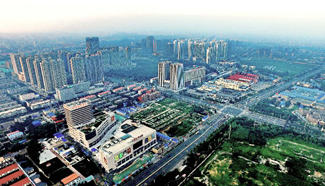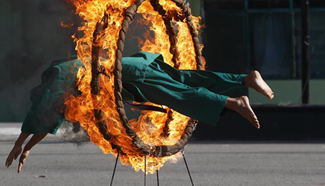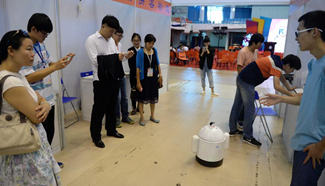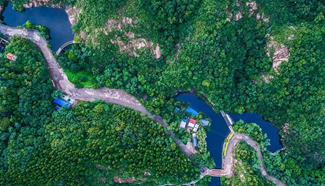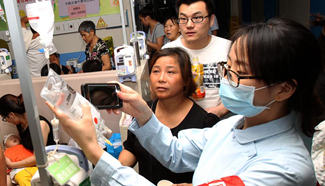TANGSHAN, Hebei Province, July 27 (Xinhua) -- Calmly, Dong Huijuan explained how she had treated a survivor of the devastating Wenchuan earthquake on May 12, 2008, who was suffering from post-traumatic stress disorder (PTSD).
Dong, 57, said her patient, a 17-year-old girl, had to have her leg amputated. The combination of loosing a limb and the terrifying experience of the earthquake was so traumatic that she refused to leave her hospital bed for 21 days.
When working with survivors of extremely tragic events, Dong uses her own experience as a way to coax her patients into opening up; "I also survived an earthquake. I'm an orphan of the Tangshan quake,"
After a few sessions with Dong, the girl managed to gather up enough strength to embrace Dong. "Aunt, you have brought me back to life," she said.
Dong's own experience of surviving the Tangshan earthquake planted seeds of interest in psychology -- she knows all too well how painful it is to recall terrifying events.
Dong is a psychology professor at Tangshan Normal University and the director of the disaster psychological intervention center at Tangshan's No. 225 Hospital.
Dong entered Hebei Normal University in 1980 majoring in sports psychology. In 1986, she attended graduate school in neighboring Shandong Province, and in Beijing in 2003, she became the first person in China to gain a PhD in disaster psychology.
She has worked with survivors of the Indian Ocean Tsunami at the end of 2004 and the Wenchuan earthquake in 2008.
"I just want to treat -- or at least relieve -- the pain of those who, like me, have suffered," Dong said.
BLACK ASH, DEEP SORROW
Dong was one of the 4,204 children orphaned by a magnitude-7.8 quake that flattened Tangshan, destroying virtually all public facilities, on July 28, 1976.
That fateful day was her mother's birthday.
Her extended family had gathered at her parents home to celebrate. Her parents, brother, and sister-in-law would never celebrate her mother's birthday ever again.
Dong was trapped in debris for around seven hours, her elder sister dug her out with her bare hands.
"The seven homes in my courtyard were completely destroyed. I remember crawling on my hands and knees calling for my parents," Dong said.
She found her pregnant sister-in-law and her parents. They were all dead. As she could do nothing for them, she just sat down amid the chaos and guarded their bodies.
The air was thick with groans, howls, and shouts from all directions,. These sounds have haunted her for years. "It was so bleak," she recalled.
"My parents were dug out three days after the quake. Their bodies had started to swell and decay. The Liberation Army came to Tangshan to assist the rescue work and bury the bodies to prevent an epidemic," Dong said."They took my mother away on a truck. She was just one of many corpses."
"'Where are you going to take her?' I asked, but no one answered."
"I had no where to go and pay my respects. That was the cruelest part," Dong sighed.
In the following years, many Tangshan quake survivors had nowhere to mourn their deceased every July 28, so they resorted to crying and burning paper on crossroads throughout the city.
"The city was covered in black ash and deep sorrow."
ATTEMPT TO CURE
Even after many years had passed, Dong said many people were still struggling to come to terms with the tragedy.
When she was at college someone in the room above her dropped a heavy object on the floor, Dong and her room mates rushed outside in a panic. One was so scared that he jumped out of a second floor window.
"We were all from Tangshan. We thought the noise was an earthquake," Dong said.
Her neighbor who lost his wife and parents in the quake also suffered from PTSD.
"He would either be laughing or crying. He could not string a complete sentence together and would often just repeat phrases such as 'I'm not sad' or 'stay alive,'" she said.
Dong found that time did not expel the shadow cast by the tragedy so she took up psychology to help other people plagued by trauma and cure her own inner pains.
In 1996, a health center in Tangshan conducted an investigation into the mental wellbeing of the city's residents. It showed that 402 of the 1,813 respondents suffered from PTSD.
"This was before certain medical advancements and no one thought about the mental wellbeing of survivors. So the best time to treat people in Tangshan was missed," she said.
By the time the Wenchuan earthquake occurred, medical science and practice had improved significantly, according to Dong.
Three days after the Wenchuan quake, Dong and 13 other psychologists were dispatched to offer counselling and support. They were the first psychological intervention team sent to the area after the disaster.
"I don't expect children in Sichuan to suffer like those in Tangshan," Dong said.
An investigation from West China School of Medicine in Sichuan showed that only 10 percent of the quake-affected respondents suffered from PTSD -- much lower than in Tangshan.
As one of China's first disaster psychologists, Dong has been offered many opportunities in other cities but she does not want to leave Tangshan.
"I won't leave Tangshan. The people living here still need me," Dong said.

